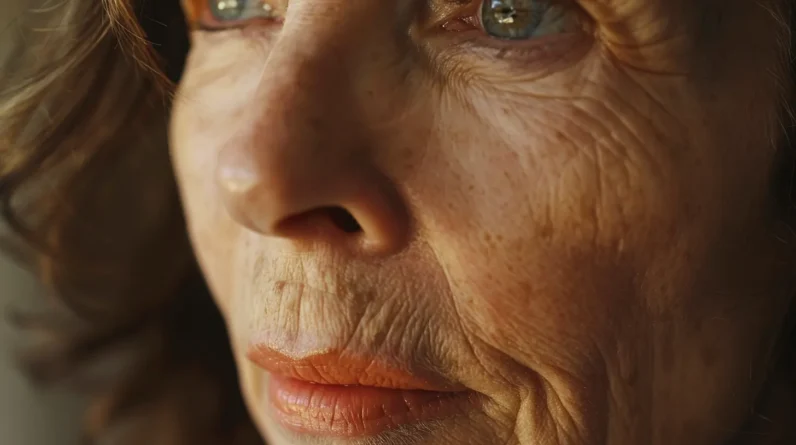
Menopause notably impacts women’s skin health due to hormonal changes, primarily the decline in estrogen. We see a 30% loss in collagen within the first five years, leading to thinner, drier skin and increased wrinkles. Moisture retention declines, causing irritation and exacerbating conditions like acne and rosacea. Women may notice age spots, uneven skin tone, and increased facial hair. To combat these changes, we recommend daily SPF use, moisturizers with hyaluronic acid, and gentle cleansers. Professional treatments like chemical peels and laser therapy can enhance results. Lifestyle adjustments, including hydration and a balanced diet, play an essential role in maintaining skin health during this change. Understanding these changes is key to effective management.
Hormonal Changes and Skin Impact
Nearly all women experience significant hormonal shifts during menopause, profoundly impacting their skin health. The dramatic decline in estrogen levels leads to a cascade of skin changes, most importantly reduced collagen production. This results in thinning skin, increased wrinkles, and sagging. We observe that approximately 30% of collagen loss occurs within the first five years of menopause, accelerating the aging process.
Estrogen depletion also impairs the skin’s moisture retention capabilities, causing dryness and heightened susceptibility to irritation. Hormonal fluctuations can exacerbate existing skin conditions, such as acne and rosacea. The relative increase in testosterone levels can trigger unwanted facial hair growth and hormonal acne flare-ups. These changes necessitate a reevaluation of skin care routines to address the unique challenges of menopausal skin, focusing on hydration, collagen support, and management of hormonal imbalances.
Common Menopausal Skin Concerns
Menopausal women face a myriad of skin concerns that directly result from hormonal fluctuations. We observe significant changes in skin texture, hydration, and appearance during this period. The decline in estrogen levels leads to a 30% collagen loss within the first five years, causing increased wrinkles and skin fragility. Dryness and itching become prevalent due to decreased natural hydration agents. Acne may persist or re-emerge, while increased facial hair growth affects about 40% of women over 45.
Common menopausal skin concerns include:
– Accelerated collagen loss and wrinkle formation
– Dryness and itching due to reduced hydration
– Acne flare-ups from hormonal imbalances
– Increased facial hair growth
Age spots and uneven skin tone also become more pronounced during menopause, often exacerbated by sun exposure. To mitigate these changes, we recommend a thorough skincare routine that includes hydration, collagen support, and daily sunscreen application.
Skincare Strategies for Menopausal Women
Addressing the unique skincare needs of women during menopause, we’ve developed targeted strategies to combat the effects of hormonal changes on the skin. We recommend daily application of broad-spectrum SPF 30+ sunscreen to mitigate UV damage and prevent age spots, vital as menopausal skin becomes more susceptible to sun-induced changes. Incorporating moisturizers with hyaluronic acid or glycerin is essential for hydration, counteracting the dryness caused by decreased estrogen levels.
We advise shifting to mild, creamy cleansers to avoid further dehydration. Regular use of retinoids can enhance collagen production and improve skin texture, addressing fine lines and wrinkles. Gentle exfoliation, ideally under dermatological guidance, promotes even skin tone while being mindful of increased sensitivity. These strategies aim to maintain skin health and mitigate the dermatological impacts of menopause.
Professional Treatments and Interventions
For those seeking more advanced solutions to menopausal skin changes, professional treatments and interventions offer targeted approaches. As mature skin loses elasticity and volume due to hormonal shifts, we recommend consulting a dermatologist for personalized strategies. These may include:
– Chemical peels for improved skin tone and texture
– Laser treatments addressing pigmentation and collagen synthesis
– Microneedling to stimulate skin rejuvenation
– Injectable treatments like Botox and dermal fillers for wrinkle reduction
Professional treatments can effectively combat the signs of aging associated with menopause. Chemical peels remove dead skin cells, while laser treatments promote collagen production. Microneedling creates micro-injuries that trigger healing processes, enhancing skin’s appearance. Injectable treatments temporarily restore lost volume and diminish wrinkles. When combined with appropriate skincare routines and potentially hormone replacement therapy, these interventions can greatly improve the health and appearance of menopausal skin.
Lifestyle Adjustments for Skin Health
While professional treatments offer targeted solutions, adopting specific lifestyle adjustments can greatly enhance skin health during menopause. We must recognize that during this phase, skin can become dry and less resilient. To help combat these changes, staying hydrated plays an important role. We should prioritize drinking plenty of water to maintain skin moisture. A balanced diet rich in antioxidants from fruits and vegetables is essential for neutralizing free radicals and combating skin aging.
Regular exercise enhances circulation and helps manage stress, both beneficial for skin well-being. We must limit smoking and excessive alcohol consumption, as these contribute to premature aging. Stress management options include yoga and meditation, which can reduce skin flare-ups and irritation. By implementing these lifestyle adjustments, we can considerably improve our skin’s health and appearance during menopause.
Conclusion
As we’ve explored, menopause’s hormonal shifts can wreak havoc on our skin. But we’re not powerless against this tidal wave of change. By understanding the unique challenges menopausal skin faces, we can tailor our skincare routines, seek appropriate treatments, and make lifestyle adjustments to maintain our skin’s health and liveliness. With the right approach, we can navigate this shift gracefully, keeping our skin resilient and radiant throughout menopause and beyond.







